Adolf Eichmann
Bureaucratic Murderer
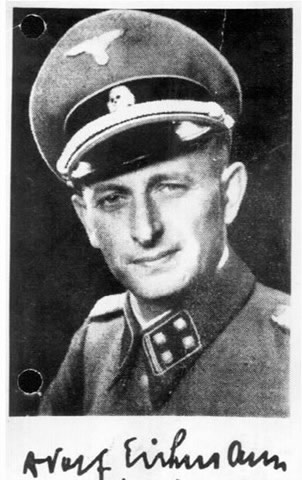
by Dennis Pollock
Adolf Eichmann was not a monster. He possessed no fangs, no claws, nor was he the least bit physically imposing. Stripped from the Nazi uniform he wore in the 1930s and 40s, and the haughty spirit that always seemed to accompany that uniform, under normal circumstances and in other seasons of his life he came across as a quiet, short little bureaucrat with a penchant for orderliness – which was pretty much what he truly was, if you overlook the six million Jews whose slaughter he made possible with his well-run death trains and deportations of Jews to such notorious places as Auschwitz, Treblinka, and other killing factories.
When Eichmann was captured by Israeli intelligence in Argentina and brought to Israel for trial in 1960, the world sat up and took notice. In some ways it was his trial, not O. J. Simpson’s or the trial for the kidnapping of Charles’ Lindbergh’s baby, which could truly be called the (international) trial of the century. As a result the name of Adolf Eichmann has become synonymous with murder, and is mentioned along with Goering, Himmler, and Goebbels, as one of Adolf Hitler’s top men.
Adolf Eichmann started out in life with no indications that he would ever participate in the greatest mass slaughter of human beings the world has ever seen. He was born in a devout protestant, Calvinistic family, and his father was especially religious, although like most German men in those days, he was very demanding and not especially warm toward his children. As Adolf grew, he showed little promise in school, never taking his studies very seriously. Eichmann did not stand out in any way, and would never have been voted “most likely to succeed” or “most popular student.” Like his master, Hitler, it would take the poisonous seeds of anti-Semitism and a mega-dose of German nationalism to raise him from mediocrity to ultimately winning a major position in history’s “Hall of Shame.”
Convert to Nazism
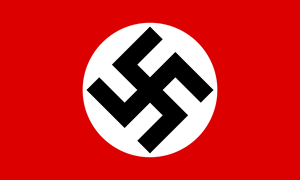 Upon graduating from high school Eichmann worked at several jobs, but eventually his interest in the rising Nazi party and its charismatic leader, Adolf Hitler, led him to join the Nazis and secure a position in the security service of the SS. He was soon noticed by a subordinate of Heinrich Himmler, and promoted to a new branch that they liked to call the Jewish Museum. It was in fact an office dedicated to studying “the Jewish problem,” and finding ways to expel Jews, first from Germany, and later from all the many nations that would come under her rule. By this point Eichmann had been totally infected with the spirit of anti-Semitism that was rife throughout all of Germany. Germany’s defeat in World War I, the depression that had stripped so many of their jobs and fortunes, the general malaise that made so many Germans feel that they had no future – all of this and more was blamed on the Jews in their midst, many of whom had the gall to prosper while so many “true” Germans were struggling. Such a worldview was in those day the politically correct way to think and speak, and Eichmann came to believe these things heart and soul.
Upon graduating from high school Eichmann worked at several jobs, but eventually his interest in the rising Nazi party and its charismatic leader, Adolf Hitler, led him to join the Nazis and secure a position in the security service of the SS. He was soon noticed by a subordinate of Heinrich Himmler, and promoted to a new branch that they liked to call the Jewish Museum. It was in fact an office dedicated to studying “the Jewish problem,” and finding ways to expel Jews, first from Germany, and later from all the many nations that would come under her rule. By this point Eichmann had been totally infected with the spirit of anti-Semitism that was rife throughout all of Germany. Germany’s defeat in World War I, the depression that had stripped so many of their jobs and fortunes, the general malaise that made so many Germans feel that they had no future – all of this and more was blamed on the Jews in their midst, many of whom had the gall to prosper while so many “true” Germans were struggling. Such a worldview was in those day the politically correct way to think and speak, and Eichmann came to believe these things heart and soul.
But what really settled the matter for him was the hero worship he attributed to Adolf Hitler. To Eichmann, Hitler was the perfect German, the perfect man, and the ultimate leader. And when Hitler blustered that all Germany’s problems were caused by the nasty, sub-human Jews, Eichmann gladly embraced and absorbed the lie. When he joined the SS, he had taken an oath, not to Germany, not to serve his country, but to Hitler himself, and young Eichmann took his vow with the utmost seriousness. Twenty-five years later, when on trial for his life in Israel, he defended all that he had done on the basis of that vow, stupidly assuming his judges would be so impressed by his loyalty to his oath that they would surely let him go free. He was mistaken.
“Expert” on the Jews
With his new position and his new status, Eichmann gave himself heart and soul to his work. He read all sorts of books about Jews, and even took a trip to Israel to learn about more efficient ways of deporting European Jews to Israel. He became known in Nazi circles as their resident “expert on all things Jewish.” At that stage there was no talk about killing the Jews, or the “final solution.” The Nazi attitude was that Jews were like a disease in Germany and must be sent elsewhere. Eichmann was totally behind this effort, and his studiousness and fanaticism soon got him noticed by some of the Nazi heavy hitters. When Germany “annexed” Austria, Eichmann was given a position in Vienna of heading the organization which oversaw the forced deportation of the Jews. Their goal was to entirely rid Austria of every single Jew, and Eichmann eventually was processing around 1,000 Jews a day, leaving for other lands.
The young Nazi overseer relished his role and enjoyed many of the perks of his new position He was married, but such an important man could not be limited to one woman. He had a couple of regular mistresses and involved himself with other sexual dalliances as he had opportunity. One Jew who dealt with him in these days called him “A conceited dandy, a vain man who was well aware that his dapper appearance made an impression upon people.” Eichmann was a small, short man, but his ego grew enormous as he began to assume the power to control the lives of thousands of individuals. Of course to his superiors he was a boot-licker, a totally submissive lackey willing to do whatever was asked of him, but to those under his control he was absolute master, and he made sure they understood that.
By the time he left Vienna in May, 1939, over 100,000 Jews had been legally deported, and many others had been smuggled out, forced out, or allowed to leave without a visa. Eichmann hadn’t succeeded in ridding Austria of every single Jew, but no one could say he hadn’t given it all he had. With the beginning of World War II, there was a gradual change in the Nazi hierarchy as to what to do with the Jews. Under wartime conditions, deportation was becoming more and more impractical, requiring too many resources which Germany no longer had the luxury of providing. Of course any reasonable man would have given up the idea altogether and concentrated on winning the war. But Adolf Hitler was never known for his reasonableness. Deportation must be converted to extermination. Deporting the Jews must be ended; slaughtering them must begin. By January, 1942, Eichmann’s boss, Reinhard Heydrich, convened a meeting of Nazi leaders, including Eichmann, and informed them that Hitler had ordered all Jews under German occupation to be killed. Systems must be put in place immediately, concentration camps turned into killing machines, and a system of train transportation must be worked out to get the Jews from their homes to the camps where they would be put to death. Eichmann was to be in charge of identifying the Jews, stripping them of their assets, and putting them on trains headed for the death camps, while keeping accurate and precise statistics of the entire procedure.
While on trial he was asked his response when he learned that the Jews were to be killed. He declared indignantly: “There was nothing to say.” In Eichmann’s inverted thinking, an order from above simply could not be questioned or resisted.
The Zealot
But if we were to begin to believe that poor Adolf Eichmann was a good and decent man, reluctantly forced to do terrible things by his superiors, we would be greatly mistaken. When we look into his career, his actions, and the statements made by him, it becomes crystal clear that Eichmann absolutely loved his job and took great pride in his murderous efficiency. His Jewish prosecutor stated: “He once received information that at the Russian-Romanian border several thousand Jews had been slaughtered by a local militia, and their bodies thrown into the river. He was beside himself with rage, not for humanitarian reasons, but because he said he would lose track of the numbers. And when he came to kill the Romanian Jews, the figures would be wrong and some might get away.” Eichmann was adamant that not only would his trains packed with Jews reach their destinations; they must be absolutely punctual. Any train arriving later than scheduled was a disgrace and reflected poorly upon him.
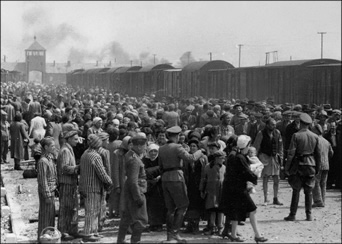 Over the next several years thousands of train cars and millions of Jews were organized and sent to the camps under the direction of this bureaucrat. As far as can be determined, Eichmann never shot one Jew, never gassed a Jew, and never killed any Jews with his own hands. His method was rather death by signature, death by organization, death by administration, death by bureaucracy… He made sure the trains were running smoothly, and Jews of every age, including the children, were herded like cattle onto train cars for slaughter. Neil Bascomb writes: “Although he wore a uniform, he measured success not in battles won but instead in schedules met, quotas filled, efficiencies realized, guidelines followed, and units moved.”
Over the next several years thousands of train cars and millions of Jews were organized and sent to the camps under the direction of this bureaucrat. As far as can be determined, Eichmann never shot one Jew, never gassed a Jew, and never killed any Jews with his own hands. His method was rather death by signature, death by organization, death by administration, death by bureaucracy… He made sure the trains were running smoothly, and Jews of every age, including the children, were herded like cattle onto train cars for slaughter. Neil Bascomb writes: “Although he wore a uniform, he measured success not in battles won but instead in schedules met, quotas filled, efficiencies realized, guidelines followed, and units moved.”
During the last years of World War II it became clear even to the most fanatical Nazis that their cause was lost. Eichmann was conflicted. On the one hand, he knew that to continue to send Jews to their deaths could make him a hunted man after Germany lost the war. Still, he had built up such momentum and taken such enormous pride in doing his part in ridding the world of Jews, he could not bring himself to stop. His Israeli prosecutor noted: “The German generals were pleading for trains to transport arms and men. He resorted to tricks to ensure he got his death trains, although he knew he was sabotaging the war effort. He told friends, ‘The war is lost, but I will win my war.’ ” Finally even the fanatical Himmler realized that the murders must stop, and ordered Eichmann to desist.
At the war’s end, and with his idol, Adolf Hitler, dead by his own hand, Eichmann became a lost soul. With no great mission to fulfill and no one to give him orders, he laid low, changed his name, and eventually managed to get a job as a forester in a logging operation in northern Germany. It’s hard to imagine the nerdy, fussy Eichmann as a lumberjack, but he had little choice and made a go of it for several years, until the company folded and he had to look for other means of support. Meanwhile the pressure for finding him was intensifying. At first the Allies had not realized just how much this man had contributed to the Nazi slaughter.
But after the Nuremberg trials of some of his more public contemporaries, the name of Eichmann was being written and heard more and more, and there were many who desperately longed to bring this bureaucratic murderer to trial and execution. Eichmann decided things were getting too hot, and with the help of Nazi sympathizers was put on a ship and made his way to Argentina, whose German-leaning dictator was welcoming Nazi fugitives with open arms.
Life in Hiding
Adolf Eichmann would never see the soil of his beloved Germany again. Nor would he ever rise to any kind of prominent position the rest of his life. It seemed that once removed from the source of his pride and the reason for his existence, he descended into the realm of the ordinary, as though he had never been one of the most powerful men in the mightiest nation in Europe. Eichmann became what he had been before being infected by the Nazi doctrines – ordinary and entirely unimpressive. He worked at low-paying jobs for the most part, and lived in houses that had neither running water nor electricity. The man who had been chauffeured around Europe in a Mercedes Benz now had no car and was forced to take smelly, crowded buses to work and back.
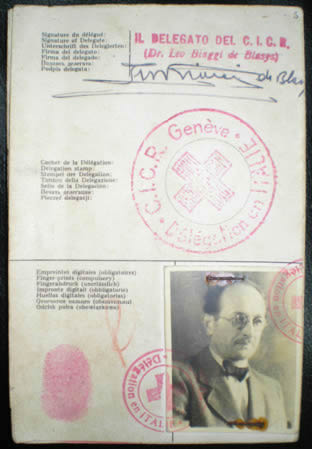 |
Fake passport used to enter Argentina |
Strangely, he who proved so incredibly efficient in serving Hitler, was not particularly skillful at regular jobs. One of the better jobs he held for a time was a position in a hydroelectric company, but he was eventually fired. His boss later said, “He wasn’t accurate enough. And I had the feeling that when it came to recording water levels or collecting the data, he didn’t have any talent for organization.” To my mind, this is one of the strangest aspects of the entire, bizarre story of this evil man. He who had performed with such precision and near-perfection in his role as administrator over the trains which took men and women to their deaths in Germany, couldn’t make the grade measuring water levels in Argentina. It would seem that, without his racist, hate-filled, Nazi surroundings, and German nationalism raging in him at a fever-pitch, Adolf Eichmann could barely rise to the level of mediocrity. Take away the flashy uniform, the riding crop, the authority over millions of souls, and the thrill of serving one of the most diabolical men to walk the soil of our planet, and Eichmann could barely function.
After a couple of quiet, solitary years in Argentina, Eichmann could no longer bear to live alone, and contacted his wife in Germany. He arranged for her and their three sons to come to Argentina in a way that would leave no evidence of where she had gone. She was glad to join her husband but was troubled about all she had been hearing of his wartime activities and asked him about it. He told her he had never killed anyone and she accepted his word. They set up housekeeping and lived a quiet and simple life for the next thirteen years. They preferred living in isolated areas or neighborhoods with just a few scattered houses, so as to maintain privacy and avoid anyone learning Adolf’s true identity.
Eichmann’s great mistake was in not insisting that his sons change their last name. Although he had taken the alias of Ricardo Klement, his sons kept their original names. It would cost him dearly. At one point one of the boys became interested in a young lady, whose father had emigrated from Germany. Unknown to the boy, who had been infected with his father’s anti-Semitism, the girl’s father was half Jewish and had suffered at the hands of the Nazis. When he learned his daughter was dating a young man with the last name of Eichmann, and who boasted that his father had been an important man in Hitler’s regime, it didn’t take him long to make the connection. He contacted a Jewish prosecutor in Germany, who relayed the information to the government of Israel.
It took a while for Israel to confirm that this was likely Eichmann, but at last they became convinced. Knowing that Argentina would never arrest the former Nazi, nor were they likely to ever extradite him to Israel or back to Germany, they decided to come and get him themselves.
Caught!
A team of Israeli intelligence agents was eventually dispatched to Argentina. Their task was to kidnap the man, ascertain that he was truly Eichmann, and if so, to sneak him back to Israel where he would stand trial. Prime Minister David Ben Gurion was insistent that he should not be harmed or killed. He was to be returned to Israel where he would face a trial, and where the grim nature of the holocaust might be laid bare.
The various members of the kidnapping team arrived by different routes and using fake passports. They quickly located the house where Eichmann and his family had recently moved and began studying his movements. It was readily evident that Eichmann was still a creature of habit, going through the same rituals every day and maintaining the same schedules. Every night he would arrive near his home between 7:45 and 8:00 pm, walking down the same street, circling around his house so as to check out his tiny garden, and then going into the house where he would play with his youngest son, whom his wife had born to him just five years previously.
It proved relatively easy to capture Eichmann on the lonely road near his house. The agents waited in two cars located close to where they knew he would be dropped off by the bus. When he arrived, three men quickly grabbed him, threw him into the car, and whisked him to a safe-house which they had rented and prepared, complete with a soundproof room. Although Eichmann had resisted violently upon first being grabbed, once in the car he knew there was nothing to be done, and when told to keep quiet, he meekly replied, “I surrender to my fate.”
One might suppose that this Nazi who had held such authority and wielded the power of life and death over millions, would have been a stone-cold prisoner, offering no information and demonstrating absolute fearlessness. Instead the opposite was true. Never was there a more compliant prisoner than Eichmann, who politely said, “Yes sir” and “No sir” to his captors and did everything that was asked of him. When they first took him to the toilet he even asked permission to have a bowel movement, and later asked permission to wipe himself.
The Israeli agents were astonished by their new prisoner. It was a shock to them that he had lived in such poor surroundings, lighting his home with kerosene lamps, living in a lower class neighborhood (even by Argentina standards), and wearing threadbare clothes. But more amazing was his demeanor. He was so utterly and thoroughly ordinary. Knowing they had captured the man responsible for the deaths of millions of Jews, a man who was one of the Nazi elites, they had expected far more than this mousey, little man who trembled constantly and whose face frequently twitched with fear. Here was the cream of the cream, the ultimate Nazi, and he was clearly a wimp – at least when the shoe was on the other foot. It took their interrogator no time at all to get him to admit who he was. Later, when they smuggled him onto an Israeli “El Al” airplane disguised as a flight attendant, he even offered advice when he noted that he didn’t look quite right – the other men were dressed in blazers and he was in his shirtsleeves. They agreed and put a blazer on him. Heavily sedated, he was escorted by the agents onto the plane, and after a lengthy flight, the Nazi anti-Semite and Jew-killer found himself in the land of the Jews.
Day in Court
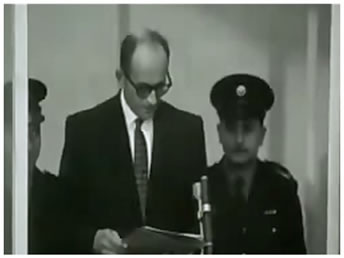 |
Eichmann on trial in Israel |
The world watched his trial in fascination as Eichmann defended his actions in the face of a vigorous prosecution. Knowing he could not deny what he had done, he placed his entire defense on the basis of “following orders.” He shaded and spun his testimony to give the impression that he, too, recognized that the killing of the Jews was a terrible thing, but continually came back to one point: as a soldier under oath he had no choice but to follow orders. Amazingly he even admitted that if he had been a concentration camp commandant ordered to gas Jews, or a soldier ordered to shoot Jews, he would have done it. He really and truly thought he could get his judges to see things the way he did – that a soldier must always follow orders unquestioningly. He had been taught this in Germany, and it seemed beyond his comprehension that anyone could seriously doubt this fundamental principle.
He failed to see that there are certain deeds so obviously and blatantly evil, that if called to engage in them by a higher authority, resistance and rebellion are the only moral and ethical responses. When the verdict was reached by the three Israeli judges, Eichmann was found guilty of “crimes against humanity” among other charges, and was sentenced to death. He was hanged on June 1, 1962.
Lessons Learned
Usually, we prefer our villains bigger than life – mean, nasty, strong, irrational, ugly, and so forth. And history has occasionally provided us with such people. But many of the men who have led notoriously wicked lives or who committed unspeakable atrocities, were in many respects, not so different from the rest of us. Adolf Eichmann is surely a quintessential example of the second type. There was so much that he was not. He was not charismatic, not dynamic, not strong, not brilliant, not brave, not creative, not a leader, nor was he crazy. Eichmann was a fairly ordinary man infected with a vicious, hateful worldview which held that all men are not created equal in the sight of their Creator. In his mind, some men and women are considerably inferior to others, and do not deserve to live with their superiors. He once said, “I will leap into my grave laughing because the feeling that I have five million human beings on my conscience is for me a source of extraordinary satisfaction.” He went to his death stubbornly, refusing to admit he had done wrong, and surprised that everyone else couldn’t see this.
In some ways Adolf Eichmann serves as a parable to the human race. For fifteen years after World War II ended it appeared as though he had gotten away with his crimes, and would live out his days unpunished and unmolested. He lived with the comforts of wife, children, and home. But one dark night, as he was returning home from work, just as he had done countless nights before, Eichmann’s time came, and the long arm of Israeli justice reached out 9,000 miles, and took him. He was put on trial, a privilege never extended to his victims. And he would find himself with a noose around his neck, facing a premature end to his life, just as he had caused for millions of Jews.
Eichmann’s story parallels our own in that every one of us have committed sins and offenses against our Creator and our fellow man. We are all fugitives from divine justice. And like Eichmann, we appear as though we are getting away with it. We live comfortably, go to concerts, dine out in nice restaurants, watch football games, play with our children, buy expensive cars, and go to theaters to watch the latest movies. Still, if we have not found the forgiveness that is in Jesus Christ, we are criminals, offenders against God’s holy laws, and subject to His holy and eternal penalties.
And just like Eichmann, we too will face a type of sudden, totally unexpected arrest. For most of us it will not be as dramatic as a kidnapping by Israeli agents on a dark night. It will more likely be a heart attack, a bout with cancer, a car accident, a mysterious sudden infection, or perhaps simply the ravages of old age. But eventually we, too will be apprehended and brought before our own personal tribunal. Evidence will be brought forth. And if we are without the proper defense, we shall be found guilty and sentenced to pay for our crimes against humanity and humanity’s God.
“Not Guilty”

All is not lost. The Bible tells us that God loves us so much, He has prepared our defense for us. He has sent His Son Jesus Christ to die in our place and take the punishment for us that we so completely deserve. And having died on the cross and risen again three days later, Jesus now serves not only as our sacrificial Lamb, but also as our Defense Counsel and our Advocate. He shall speak for us on the Day of Judgment; He shall be both our Judge and our Advocate, and shall declare us justified – not merely pardoned, not simply excused, but made without sin, without blame, and entirely free from penalty and punishment. The Bible tells us: “Therefore, having been justified by faith, we have peace with God through our Lord Jesus Christ” (Romans 5:1).
Throughout the history of our world, men and women have suffered and died as a result of terrible plagues and infectious diseases. These horrible afflictions sweep across communities and nations, devouring and destroying as they go. In like manner, our world is filled with many spiritual infections and diseases which also destroy, defile, and infect peoples, communities, and entire populations. Anti-Semitism is but one of them. Sexual immorality, homosexuality, racism, false religions, terrorist ideology, absurd imaginations about the “right” to slay unborn babies, and secularism are also among them. To survive these currents of lies and deceptions, we must have a strong immune system. The protection we so desperately need is the love of God and the Word of God, which become a vital part of our lives when we make Jesus Christ our Lord and Savior. Having rejected the Christ and the Bible of his parents, Adolf Eichmann had no such protection, and has become a terrible reminder to us all, that apart from Christ and His Word, even ordinary men and women can do monstrous things.
![]()
To see a full listing of all articles available, go to our Written Devos Page.
For a full listing of all articles as audio mp3
files (free downloads), go to our Audio Devos Page.
For inspirational devos, bios of Christian leaders, free downloads, and the latest SOGM news:
Your donations are needed and greatly appreciated!

















